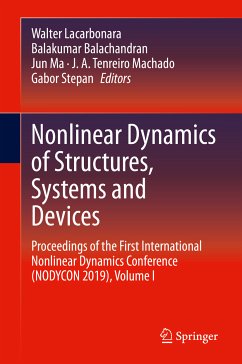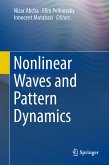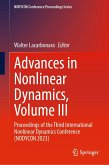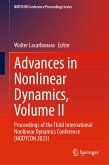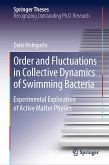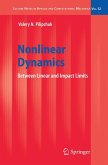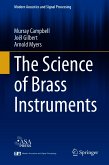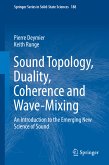Nonlinear Dynamics of Structures, Systems and Devices (eBook, PDF)
Proceedings of the First International Nonlinear Dynamics Conference (NODYCON 2019), Volume I
Redaktion: Lacarbonara, Walter; Stepan, Gabor; Tenreiro Machado, J. A.; Ma, Jun; Balachandran, Balakumar


Alle Infos zum eBook verschenken

Nonlinear Dynamics of Structures, Systems and Devices (eBook, PDF)
Proceedings of the First International Nonlinear Dynamics Conference (NODYCON 2019), Volume I
Redaktion: Lacarbonara, Walter; Stepan, Gabor; Tenreiro Machado, J. A.; Ma, Jun; Balachandran, Balakumar
- Format: PDF
- Merkliste
- Auf die Merkliste
- Bewerten Bewerten
- Teilen
- Produkt teilen
- Produkterinnerung
- Produkterinnerung

Hier können Sie sich einloggen

Bitte loggen Sie sich zunächst in Ihr Kundenkonto ein oder registrieren Sie sich bei bücher.de, um das eBook-Abo tolino select nutzen zu können.
This first of three volumes from the inaugural NODYCON, held at the University of Rome, in February of 2019, presents papers devoted to Nonlinear Dynamics of Structures, Systems and Devices. The collection features both well-established streams of research as well as novel areas and emerging fields of investigation. Topics in Volume I include multi-scale dynamics: coexistence of multiple time/space scales, large system dynamics; dynamics of structures/industrial machines/equipment/facilities (e.g., cable transportation systems, suspension bridges, cranes, vehicles); nonlinear interactions:…mehr
- Geräte: PC
- ohne Kopierschutz
- eBook Hilfe
- Größe: 21.89MB
![Nonlinear Waves and Pattern Dynamics (eBook, PDF) Nonlinear Waves and Pattern Dynamics (eBook, PDF)]() Nonlinear Waves and Pattern Dynamics (eBook, PDF)121,95 €
Nonlinear Waves and Pattern Dynamics (eBook, PDF)121,95 €![Advances in Nonlinear Dynamics, Volume III (eBook, PDF) Advances in Nonlinear Dynamics, Volume III (eBook, PDF)]() Advances in Nonlinear Dynamics, Volume III (eBook, PDF)169,95 €
Advances in Nonlinear Dynamics, Volume III (eBook, PDF)169,95 €![Advances in Nonlinear Dynamics, Volume II (eBook, PDF) Advances in Nonlinear Dynamics, Volume II (eBook, PDF)]() Advances in Nonlinear Dynamics, Volume II (eBook, PDF)169,95 €
Advances in Nonlinear Dynamics, Volume II (eBook, PDF)169,95 €![Order and Fluctuations in Collective Dynamics of Swimming Bacteria (eBook, PDF) Order and Fluctuations in Collective Dynamics of Swimming Bacteria (eBook, PDF)]() Daiki NishiguchiOrder and Fluctuations in Collective Dynamics of Swimming Bacteria (eBook, PDF)73,95 €
Daiki NishiguchiOrder and Fluctuations in Collective Dynamics of Swimming Bacteria (eBook, PDF)73,95 €![Nonlinear Dynamics (eBook, PDF) Nonlinear Dynamics (eBook, PDF)]() Valery N. PilipchukNonlinear Dynamics (eBook, PDF)113,95 €
Valery N. PilipchukNonlinear Dynamics (eBook, PDF)113,95 €![The Science of Brass Instruments (eBook, PDF) The Science of Brass Instruments (eBook, PDF)]() Murray CampbellThe Science of Brass Instruments (eBook, PDF)105,95 €
Murray CampbellThe Science of Brass Instruments (eBook, PDF)105,95 €![Sound Topology, Duality, Coherence and Wave-Mixing (eBook, PDF) Sound Topology, Duality, Coherence and Wave-Mixing (eBook, PDF)]() Pierre DeymierSound Topology, Duality, Coherence and Wave-Mixing (eBook, PDF)121,95 €
Pierre DeymierSound Topology, Duality, Coherence and Wave-Mixing (eBook, PDF)121,95 €-
-
-
Dieser Download kann aus rechtlichen Gründen nur mit Rechnungsadresse in A, B, BG, CY, CZ, D, DK, EW, E, FIN, F, GR, HR, H, IRL, I, LT, L, LR, M, NL, PL, P, R, S, SLO, SK ausgeliefert werden.
- Produktdetails
- Verlag: Springer International Publishing
- Seitenzahl: 592
- Erscheinungstermin: 29. Januar 2020
- Englisch
- ISBN-13: 9783030347130
- Artikelnr.: 58594712
- Verlag: Springer International Publishing
- Seitenzahl: 592
- Erscheinungstermin: 29. Januar 2020
- Englisch
- ISBN-13: 9783030347130
- Artikelnr.: 58594712
- Herstellerkennzeichnung Die Herstellerinformationen sind derzeit nicht verfügbar.
